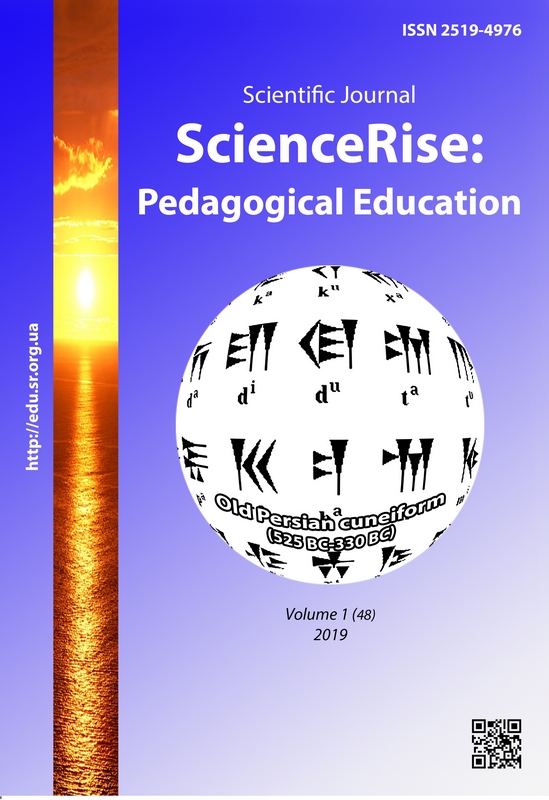The competence development of world literature fictional analysis of the student-philologist
DOI:
https://doi.org/10.15587/2519-4984.2019.155115Keywords:
personality, dialogue, dialogical reading, student, educational activity, types of assignments, textAbstract
The article deals with the problem of the formation of would-be teacher’s world literature competences that are tightly connected with expert skills and knowledge in foreign fictional work analysis. The methodological heritage on the problem of the formation and development of pupils’ abilities and skills in analyzing world literature works is studied. The traditional and newest ways of the fictional work analysis are defined. It has been demonstrated that dialogical reading of foreign fictional work is productive in the formation and development of professional skills and knowledge of students-philologists’ world literature fictional analysis. We highlight the basic, intermediate and advanced levels in forming the would-be teacher’s world literature competences. The effectiveness of the professional competence development depends on the methods and the ways of the foreign fictional work analysis chosen by a teacher. We offer the tentative system of tasks that promotes the development of students-philologists’ skills and knowledge in interpreting literary phenomena independently, the ability to combine historical, national identity and everyday life, cultural contexts during the analysis of fictional works, the ability to explore plot-compositional, subject-thematic, artistic-aesthetic, linguistic-stylistic levels of fictional work. We focus on students’ intellectual and emotional perception of the foreign fictional work that makes it possible to realize the value of fiction, and comprehend the essence of the work, form a holistic view of fiction. It has been demonstrated that the model of analysis of world literature fictional work is directed at a clear, graded, algorithmic sequence of students' learning activities
References
- Skoryna, L. V. (2013). Analiz khudozhnoho tvoru. Ternopil: Navchalna knyha – Bohdan, 424.
- Sytchenko, A. L. (2004). Navchalno-tekhnolohichna kontseptsiia literaturnoho analizu. Kyiv: Lenvit, 304.
- Hrychanyk, N. I. (2018). Analiz suchasnoho stanu sformovanosti vmin studentiv zdiisniuvaty rozghliad epichnykh tvoriv u protsesi vyvchennia kursu «Metodyka vykladannia zarubizhnoi literatury». Visnyk Cherkaskoho universytetu. Seriia «Pedahohichni nauky», 6, 38–43. Available at: http://ped-ejournal.cdu.edu.ua/article/view/2567/2714
- Klymenko, Zh. V. (2006). Etnokulturolohichnyi shliakh analizu yak efektyvnyi zasib osiahnennia natsionalnoi spetsyfiky khudozhnikh tvoriv. Vsesvitnia literatura v serednikh navchalnykh zakladakh Ukrainy, 5, 13–18.
- Chepelieva, N. V. (2004). Tekhnolohii chytannia. Kyiv: Hlavnyk, 91.
- Bakhtyn, M. M. (1986). Estetyka slovesnoho tvorchestva. Moscow: Yskusstvo, 445.
- Landt, S. M. (2006). Multicultural Literature and Young Adolescents: A Kaleidoscope of Opportunity. Journal of Adolescent & Adult Literacy, 49 (8), 690–697. doi: http://doi.org/10.1598/jaal.49.8.5
- Monobe, G., Son, E. H. (2014). Using Children’s Literature and Drama to Explore Children’s Lives in the Context of Global Conflicts. The Social Studies, 105 (2), 69–74. doi: http://doi.org/10.1080/00377996.2013.820164
- Tokman, H. L. (2016). Ekzystentsialno-dialohichne prochytannia khudozhnoho tekstu: Vybrani studii. Nizhyn: Vydavets PP Lysenko M. M., 336.
- Hrytsak, N. R. (2018). Metodychni osnovy zhanrovoho analizu khudozhnoho tvoru: retrospektyvnyi ohliad. Visnyk Zhytomyrskoho derzhavnoho universytetu imeni Ivana Franka: naukovyi zhurnal. Pedahohichni nauky, 3 (94), 42–49.
- Bhatia, V. (2002). Applied genre analysis: A multi-perspective model. Ibérica, 4, 3–19. Available at: https://www.researchgate.net/publication/28185101
- Huhnyn, A. A. (2011). Vvedenye v analyz pottycheskoho teksta. Konteksti myrovoi lyteraturi. Novopolotsk, 22–39.
- Prentice, D. A., Gerrig, R. J., Bailis, D. S. (1997). What readers bring to the processing of fictional texts. Psychonomic Bulletin & Review, 4 (3), 416–420. doi: http://doi.org/10.3758/bf03210803
- Marko, V. P. (2013). Analiz khudozhnoho tvoru. Kyiv: Akademvydav, 280.
- Miroshnychenko, L. F. (2010). Metodyka vykladannia svitovoi literatury v serednikh navchalnykh zakladakh. Kyiv: Vydavnychyi dim «Slovo», 432.
Downloads
Published
How to Cite
Issue
Section
License
Copyright (c) 2019 Natalia Hrytsak

This work is licensed under a Creative Commons Attribution 4.0 International License.
Our journal abides by the Creative Commons CC BY copyright rights and permissions for open access journals.
Authors, who are published in this journal, agree to the following conditions:
1. The authors reserve the right to authorship of the work and pass the first publication right of this work to the journal under the terms of a Creative Commons CC BY, which allows others to freely distribute the published research with the obligatory reference to the authors of the original work and the first publication of the work in this journal.
2. The authors have the right to conclude separate supplement agreements that relate to non-exclusive work distribution in the form in which it has been published by the journal (for example, to upload the work to the online storage of the journal or publish it as part of a monograph), provided that the reference to the first publication of the work in this journal is included.







